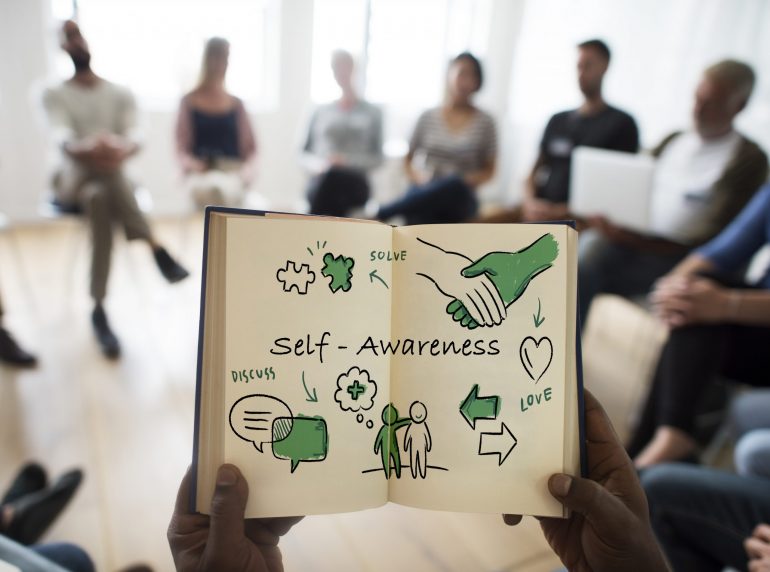
SELF-AWARENESS
Emotional intelligence or EI is the ability to understand and manage your own emotions, and those of the people around you. People with a high degree of emotional intelligence know what they’re feeling, what their emotions mean, and how these emotions can affect other people.
For leaders, having emotional intelligence is essential for success. After all, who is more likely to succeed a leader who shouts at his team when he’s under stress or a leader who stays in control and calmly assesses the situation?
According to Daniel Goleman, an American psychologist who helped to popularize emotional intelligence stated “Self-Awareness” is the first element.
What is Self-Awareness?
Self-Awareness is someone who always knows how do they feel and know how emotions and actions can affect the people around them. Being self-aware when you’re in a leadership position also means having a clear picture of your strengths and weaknesses and it means behaving with humility.
These individuals are also capable of recognizing their own strengths and limitations are open to new information and experiences and learn from their interactions with others. Goleman suggests that people who possess self-awareness have a good sense of humour are confident in themselves and their abilities and are aware of how other people perceive them.
Why is Emotional Self-Awareness Key for Leaders?
Korn Ferry Hay Group research found that among leaders with multiple strengths in Emotional Self-Awareness, 92% had teams with high energy and high performance. In sharp contrast, leaders low in Emotional Self-Awareness created negative climates 78% of the time. Great leaders create a positive emotional climate that encourages motivation and extra effort, and they’re the ones with good Emotional Self-Awareness.
Research at Cornell University showed that a high Emotional Self-Awareness score was the strongest predictor of overall success. With a developed foundation in this competency, leaders are more likely to have strengths in additional leadership competencies, such as Teamwork.
How to Develop Emotional Self-Awareness
Emotional Self-Awareness isn’t something that you achieve once. Every moment is an opportunity to be self-aware or not. It is a continual endeavour, a conscious choice to be self-aware. The good news is that the more you practice it, the easier it becomes. Research by Richard Davidson, a neuroscientist at the University of Wisconsin, suggests that one way to become more self-aware is to check in with your sensory experience.
Professor Davidson explained it this way: “We know that Emotional Self-Awareness can begin with sensations in your body or with your thoughts. When emotions are activated, they are accompanied by bodily changes. There may be changes in breathing rate, muscle tension, in heart rate. Emotional Self-Awareness in part is the awareness of one’s own body. Neuroscientists have assigned a very specific label to this and it’s called interoception, the perception of internal signals on the body. It refers to the capacity to sense one’s own heart rate, changes in one’s own heart rate, or changes in patterns of muscle tension. So, the very first and real foundation for Emotional Self-Awareness is interoception. It’s knowledge of what is going on in the body.” Tuning in more to the body’s signals is one practical way of developing self-awareness.
To be effective, leaders must have a solid understanding of how their emotions and actions affect the people around them. The better a leader relates to and works with others, the more successful he or she will be.
Take the time to work on self-awareness. Working on these areas will help you excel in the future!
As an HR consulting organization, we at Alchemy Resources pay huge importance and have implemented these practices in our own workplace. We have conducted training programmes for employees as well as managers. At ARSB, we have designed our training intervention strategies using the given methods and have executed our training programme using Learning Management System (LMS) through both synchronous and asynchronous. Contact us at enquiries@alchemyconsultancy.asia to find out how we may work together to conduct a training programme to improve performances and achieve your company’s goals.
References
- https://www.mindtools.com/pages/article/newLDR_45.htm
- https://www.verywellmind.com/components-of-emotional-intelligence-2795438
- https://www.linkedin.com/pulse/self-awareness-foundation-emotional-intelligence-daniel-goleman/
- https://www.helpguide.org/articles/mental-health/emotional-intelligence-eq.htm#


